2017人教版八年级下英语现在完成时语法讲解
英语人教版八年级下册现在完成时讲解

都用How long
.区分短暂性动词与持续性动词. 表示短暂性(瞬间性)的动词在现在完成时 的句中不能和一段时间连用.即for,since短 语或how long问句
常见非延续性动词和延续性动词的转变
非延续性动词 arrive/come/go to leave/ move become a join start/begin open close go to sleep 延续性动词 be in be away / be out be a be in/ be a member of be on be open be closed be asleep睡着了 sleep睡着了
I have lived here for 11 years. I have lived here since 2000/ 11 years ago. She has learn ed English for 5 years. 她学英语 5年了。 She has learned English since 2007. have/has /+since v过去分词 动词构成: 5 years ago.
• 2.不规则动词
Eg.
go—went—gone see---saw—seen forget—forgot—forgotten run—ran ---- run
现在完成时
1.过去发生的动作对现在造成的影响 或结果。 I’m not hungry now had breakfast
paห้องสมุดไป่ตู้t
now
我已经吃过早饭了。
把下列句子变成否定句。 I have just cleaned my clothes. not He has just had his breakfast. not
人教版八年级下册现在完成时专项讲解
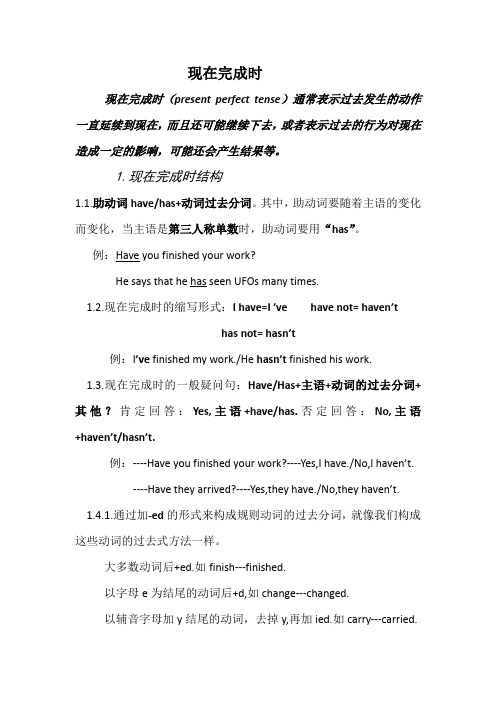
现在完成时现在完成时(present perfect tense)通常表示过去发生的动作一直延续到现在,而且还可能继续下去,或者表示过去的行为对现在造成一定的影响,可能还会产生结果等。
1.现在完成时结构1.1.助动词have/has+动词过去分词。
其中,助动词要随着主语的变化而变化,当主语是第三人称单数时,助动词要用“has”。
例:Have you finished your work?He says that he has seen UFOs many times.1.2.现在完成时的缩写形式:I have=I ’ve have not= haven’thas not= hasn’t例:I’ve finished my work./He hasn’t finished his work.1.3.现在完成时的一般疑问句:Have/Has+主语+动词的过去分词+其他?肯定回答:Yes,主语+have/has.否定回答:No,主语+haven’t/hasn’t.例:----Have you finished your work?----Yes,I have./No,l haven’t.----Have they arrived?----Yes,they have./No,they haven’t. 1.4.1.通过加-ed的形式来构成规则动词的过去分词,就像我们构成这些动词的过去式方法一样。
大多数动词后+ed.如finish---finished.以字母e为结尾的动词后+d,如change---changed.以辅音字母加y结尾的动词,去掉y,再加ied.如carry---carried.以一个元音再加一个辅音结尾的短动词,双写辅音辅音字母再加ed.如stop---stopped1.4.2.构成不规则动词的过去分词的方法有所不同,需要特别记忆。
如:come---come; hurt---hurt. lend---lent; build---builtcatch---caught; keep---kept forget---forgotten tell---toldbe---been; have---had fall---fallen; fly---flowndraw---drawn; see---seen;think---thought.2.现在完成时的用法2.1.表示过去发生或已经完成的动作,对现在造成的影响或结果。
人教版八年级下学期英语语法讲解
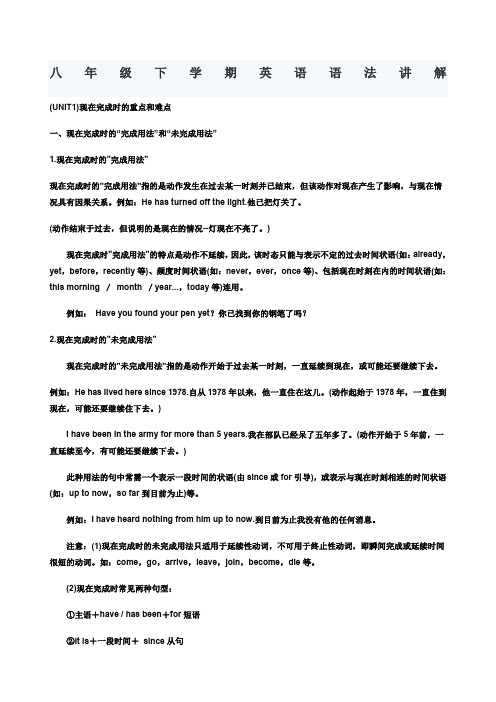
八年级下学期英语语法讲解(UNIT1)现在完成时的重点和难点一、现在完成时的“完成用法”和“未完成用法”1.现在完成时的"完成用法"现在完成时的"完成用法"指的是动作发生在过去某一时刻并已结束,但该动作对现在产生了影响,与现在情况具有因果关系。
例如:He has turned off the light.他已把灯关了。
(动作结束于过去,但说明的是现在的情况--灯现在不亮了。
)现在完成时"完成用法"的特点是动作不延续,因此,该时态只能与表示不定的过去时间状语(如:already,yet,before,recently等)、频度时间状语(如:never,ever,once等)、包括现在时刻在内的时间状语(如:this morning /month /year...,today等)连用。
例如:Have you found your pen yet?你已找到你的钢笔了吗?2.现在完成时的"未完成用法"现在完成时的"未完成用法"指的是动作开始于过去某一时刻,一直延续到现在,或可能还要继续下去。
例如:He has lived here since 1978.自从1978年以来,他一直住在这儿。
(动作起始于1978年,一直住到现在,可能还要继续住下去。
)I have been in the army for more than 5 years.我在部队已经呆了五年多了。
(动作开始于5年前,一直延续至今,有可能还要继续下去。
)此种用法的句中常需一个表示一段时间的状语(由since或for引导),或表示与现在时刻相连的时间状语(如:up to now,so far到目前为止)等。
例如:I have heard nothing from him up to now.到目前为止我没有他的任何消息。
注意:(1)现在完成时的未完成用法只适用于延续性动词,不可用于终止性动词,即瞬间完成或延续时间很短的动词。
人教版八年级英语下册现在完成时讲解及练习
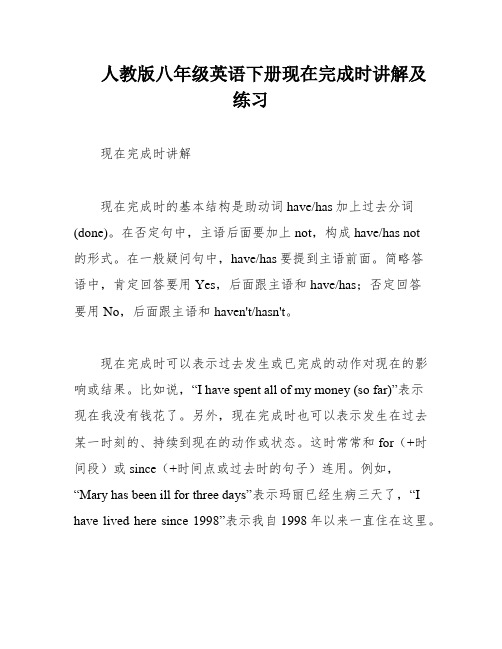
人教版八年级英语下册现在完成时讲解及练习现在完成时讲解现在完成时的基本结构是助动词have/has加上过去分词(done)。
在否定句中,主语后面要加上not,构成have/has not的形式。
在一般疑问句中,have/has要提到主语前面。
简略答语中,肯定回答要用Yes,后面跟主语和have/has;否定回答要用No,后面跟主语和haven't/hasn't。
现在完成时可以表示过去发生或已完成的动作对现在的影响或结果。
比如说,“I have spent all of my money (so far)”表示现在我没有钱花了。
另外,现在完成时也可以表示发生在过去某一时刻的、持续到现在的动作或状态。
这时常常和for(+时间段)或since(+时间点或过去时的句子)连用。
例如,“Mary has been ill for three days”表示玛丽已经生病三天了,“I have lived here since 1998”表示我自1998年以来一直住在这里。
现在完成时还有一些标志词,可以表达过去完成的动作对现在的影响。
这些标志词包括already、just和yet。
例如,“He has al ready got her help”表示他已经得到她的帮助,“He hasn't come back yet”表示他还没有回来。
This is the best film I have ever seen。
I have never seen a better movie before.He has never been to Beijing before。
He has never had the chance to visit Beijing.He says he has been to the USA three times already。
He has had the opportunity to visit the USA on three separate ns.So far。
人教版英语八年级下册(讲义)Unit 10——现在完成时 知识讲解
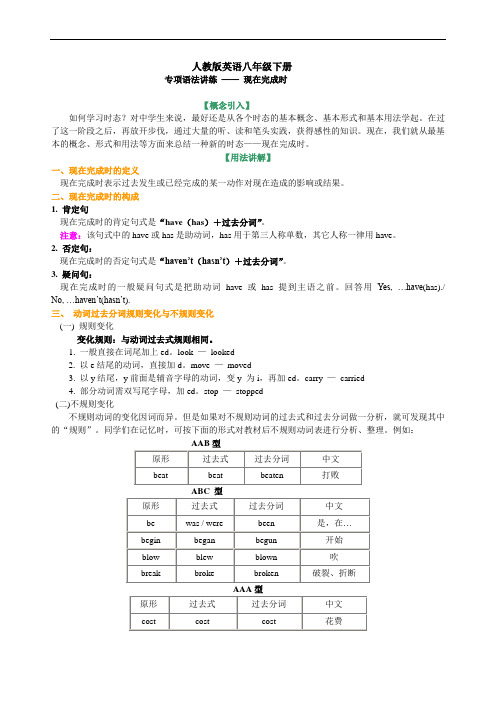
人教版英语八年级下册专项语法讲练——现在完成时【概念引入】如何学习时态?对中学生来说,最好还是从各个时态的基本概念、基本形式和基本用法学起。
在过了这一阶段之后,再放开步伐,通过大量的听、读和笔头实践,获得感性的知识。
现在,我们就从最基本的概念、形式和用法等方面来总结一种新的时态——现在完成时。
【用法讲解】一、现在完成时的定义现在完成时表示过去发生或已经完成的某一动作对现在造成的影响或结果。
二、现在完成时的构成1. 肯定句现在完成时的肯定句式是“have(has)+过去分词”。
注意:该句式中的have或has是助动词,has用于第三人称单数,其它人称一律用have。
2. 否定句:现在完成时的否定句式是“haven’t(hasn’t)+过去分词”。
3. 疑问句:现在完成时的一般疑问句式是把助动词have或has提到主语之前。
回答用Yes, …have(has)./ No, …haven’t(hasn’t).三、动词过去分词规则变化与不规则变化(一) 规则变化变化规则:与动词过去式规则相同。
1. 一般直接在词尾加上ed。
look —looked2. 以e结尾的动词,直接加d。
move —moved3. 以y结尾,y前面是辅音字母的动词,变y 为i,再加ed。
carry —carried4. 部分动词需双写尾字母,加ed。
stop —stopped(二)不规则变化不规则动词的变化因词而异。
但是如果对不规则动词的过去式和过去分词做一分析,就可发现其中的“规则”。
同学们在记忆时,可按下面的形式对教材后不规则动词表进行分析、整理。
例如:AAB型四、现在完成时的用法现在完成时表示过去某时发生的行为对主语目前产生的影响。
即用过去发生的某个行为来说明现在的某种情况。
例如:We are good friends. (现在的情况)我们是好朋友。
I knew him in 1997. (过去的动作) 我1997年认识了他。
现在完成时(unit8--unit10知识点总结)人教版英语八年级下册

现在完成时一.定义三要素与构成〔has/have done〕1.表示到现在为止已经完成或刚刚完成的动作。
By now, I have remembered 1000 English words.2.一件发生在过去的事情对现在产生影响。
常见时间状语:常和already〔已经〕,yet〔已经〕,just〔刚刚〕,still〔仍旧〕,so far〔到目前为止〕,till now,(直到现在),before〔以前〕,ever〔曾经〕,3 times(三次),in the past/last..years(在过去几年)I have spent all of my money so far.(1)already:〔已经〕用于确定句位置:放于助动词与done 之间或者放在句末(2)yet:疑问句〔已经〕否认句〔还〕位置:常放句尾(3)ever(曾经):疑问/确定位置:助动词与done之间(4)never〔从不〕位置:助动词与done之间【练习】〔1〕——你吃过早餐了吗?—Have you had breakfast ____?——是的,我已经吃过了。
/不,我还没吃。
—Yes,I have ________ had it./No,I haven’t had it ____.〔2〕I have ______ read this book,so I don’t know what it is about.〔3〕—Have you _____ been to the Great Wall? It’s so wonderful and great.—No,I have ______ been there.3.一个动作开头于过去,并持续到现在〔或许还将持续下去〕。
常见时间状语:①for+一段时间“长达/持续了……②since+过去一个时间点,表示“自从……以来〞时间段+ago,表示“从……以前〞+for+时间段从句〔一般过去时〕eg:Mary has been ill for three days.We have been classmates since 2 years ago.【练习】〔1〕我已经住在这里十年了。
英语人教版八年级下册现在完成时
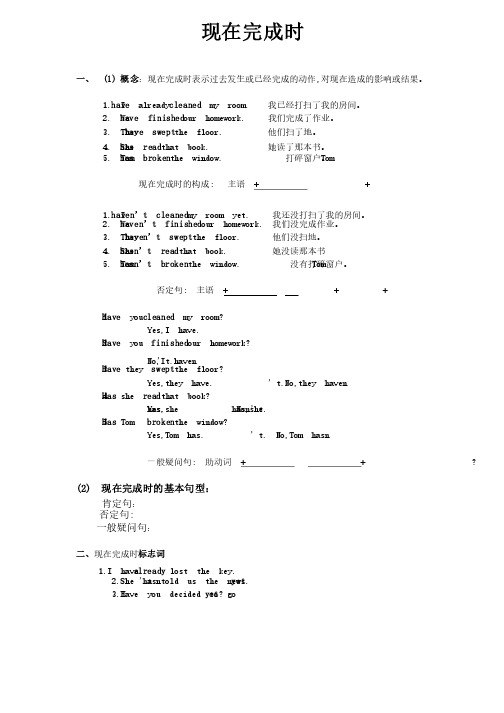
现在完成时一、 (1) 概念:现在完成时表示过去发生或已经完成的动作:现在完成时表示过去发生或已经完成的动作,,对现在造成的影响或结果。
对现在造成的影响或结果。
1. I have already c leaned cleaned my room. 我已经打扫了我的房间。
我已经打扫了我的房间。
2. We have finished our homework. 我们完成了作业。
我们完成了作业。
3. They have swept the floor. 他们扫了地。
他们扫了地。
4. She has read t hat book. that book. 她读了那本书。
她读了那本书。
5. Tom has broken the window. Tom 打碎窗户。
打碎窗户。
现在完成时的构成现在完成时的构成: : 主语主语 + + + +1. I haven haven’’t cleaned my room yet. 我还没打扫了我的房间。
我还没打扫了我的房间。
2. We haven haven’’t finished our homework. 我们没完成作业。
我们没完成作业。
3. They haven haven’’t swept t he floor. the floor. 他们没扫地。
他们没扫地。
4. She hasn hasn’’t read t hat book. that book. 她没读那本书她没读那本书5. Tom hasn hasn’’t broken t he window. Tom the window. Tom 没有打碎窗户。
没有打碎窗户。
否定句否定句: : 主语主语主语 + + + + + +1. Have you c leaned cleaned my room?Yes,I have.2. Have y ou you finishedour homework? No,I haven ’t. 3. Have they swept t he floor?the floor? Yes,they have. No,they haven ’t.4. Has she read t hat book?that book? Yes,she has. No,she hasn hasn’’t.5. Has Tom broken t he window?the window? Yes,Tom has. No,Tom hasn ’t.一般疑问句一般疑问句: : 助动词助动词助动词 + + ? + + ?(2) 现在完成时的基本句型:肯定句:肯定句:否定句否定句: : 一般疑问句:一般疑问句:二、现在完成时标志词1.I have already lost the key.2.She hasn ’t told us the news yet .3.Have you decided to go yet ?4.I have just cleaned my hands.5.John has never been to Nanjing6.Have you ever been to a museum?7.He has stayed here since 5 5 o o ’clock.David has lived here since 1992.8.He has has stayed stayed stayed here here since 5 5 hours hours hours ago. ago.His father has been in the Party since 10 years ago.9.She has taught English since he he came came came here. here.She has taught us since I came to this school.10.He has kept the book for 2 weeks.I have had this dictionary for t hree years.three years. Since: (自…以来)(1)(2)(3)for(长达)just (谓语动词之前谓语动词之前谓语动词之前) before() before(句末)句末) so far so far 到目前为止到目前为止in the past/last few years(过去几年来过去几年来) )练一练:练一练:选用选用 for for 和 since 填空填空: :1.We haven ’t seen each other ______ a long time.2.His father has been in the Party ______ 10 years ago.3.The film has been on ______ 20 minutes.4.Mr Green has worked here ______ he came to China.5.His grandparents have been dead ______ several years.6. It ’s five years _______ we met last time.1.The house is dirty. We _______it for weeks.A didn ’t cleanB hadn ’t cleanedC don ’t cleanD haven ’t cleaned2. ---Have you found your keys _______---Yes, I have _______ found them.A already; yetB yet;alreadyC already;alreadyD yet;yet3.3. -- I ’m sorry to keep you waiting.--Oh, not at all. I _____here only a few minutes.A have beenB had beenC wasD will be4.4. You don ’t need to describe her. I _______ her several times. A. had met B have met C met D meet5. --Will you go to Beijing for vacation ?--I _______ to go , but I don ’t know if I can go .A was planningB have plannedC had been planningD have been planning planning6. --When will they leave ?--They ______very soon .A do leaveB are leavingC have leftD leave7 --Was he studying for an exam ?--Yes , he's ____ it last week.A doingB to takeC makingD to give8.The teacher told the pupils that the earth ____ round.A isB wouldC wasD were9.9. She _______ such an interesting book before.A was never readingB will never readC had never readD has never rea10.10. How long do you think the meeting ______A is lastingB is lastedC will lastD lasts11. 11. I ____________(wait) for him for two hours . I am very angry . I ____________(wait) for him for two hours . I am very angry .12. 12. He _________ (be) a doctor since he was twenty .13. 13. The film __________ (be) on for fifteen minutes .14. 14. ____ you ever ____ (read) that book before ?15. 15. ____ you ever ____ (try) to change her ?16. 16. No one ____________ (arrive) here yet . No one ____________ (arrive) here yet .17. 17. ______ the bus _____ (leave) yet ?18. 18. I____ I____ I____ already already already ______ ______ ______ (see) (see) (see) the the the film. film. film.19. 19. My My My father father father ____ ____ ____ just just just _____ _____ _____ (come) (come) (come) back back back from from from work. work.20. 20. I I I _____________ _____________ _____________ (work) (work) (work) here here here since since since I I I ______ ______ ______ (move) (move) (move) here here here in in in 1999. 1999. 21. 21. So So So far far far I I I _______________(make) _______________(make) _______________(make) quite quite quite a a a few few few friends friends friends here. here.22. 22. -How -How -How long long long _______ _______ _______ the the the Wangs Wangs Wangs _______(stay) _______(stay) _______(stay) here? -For here? -For two two weeks. weeks. weeks.23. 23. I I I ________ ________ ________ just just just ___________ ___________ ___________ (finish) (finish) (finish) my my my homework. homework. homework.24.______ 24.______ you you you ______ ______ ______ (find) (find) (find) your your your science science science book book book yet? yet?一般过去时与现在完成时之比较1)一般过去时表示过去某时发生的动作或单纯叙述过去的事情,强调动作,和现在不发生关系。
(完整版)八年级下现在完成时全面知识点
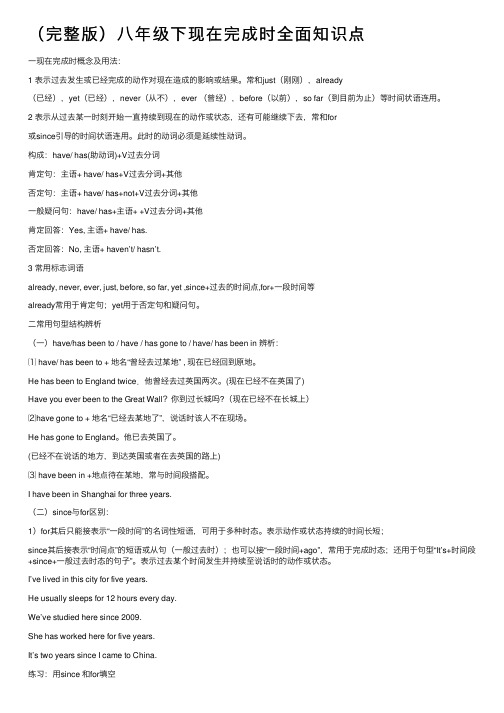
(完整版)⼋年级下现在完成时全⾯知识点⼀现在完成时概念及⽤法:1 表⽰过去发⽣或已经完成的动作对现在造成的影响或结果。
常和just(刚刚),already(已经),yet(已经),never(从不),ever (曾经),before(以前),so far(到⽬前为⽌)等时间状语连⽤。
2 表⽰从过去某⼀时刻开始⼀直持续到现在的动作或状态,还有可能继续下去,常和for或since引导的时间状语连⽤。
此时的动词必须是延续性动词。
构成:have/ has(助动词)+V过去分词肯定句:主语+ have/ has+V过去分词+其他否定句:主语+ have/ has+not+V过去分词+其他⼀般疑问句:have/ has+主语+ +V过去分词+其他肯定回答:Yes, 主语+ have/ has.否定回答:No, 主语+ haven’t/ hasn’t.3 常⽤标志词语already, never, ever, just, before, so far, yet ,since+过去的时间点,for+⼀段时间等already常⽤于肯定句;yet⽤于否定句和疑问句。
⼆常⽤句型结构辨析(⼀)have/has been to / have / has gone to / have/ has been in 辨析:⑴ have/ has been to + 地名“曾经去过某地” , 现在已经回到原地。
He has been to England twice.他曾经去过英国两次。
(现在已经不在英国了)Have you ever been to the Great Wall?你到过长城吗?(现在已经不在长城上)⑵have gone to + 地名“已经去某地了”,说话时该⼈不在现场。
He has gone to England。
他已去英国了。
(已经不在说话的地⽅,到达英国或者在去英国的路上)⑶ have been in +地点待在某地,常与时间段搭配。
人教版八年级英语下册时态专讲-现在完成时讲解+练习
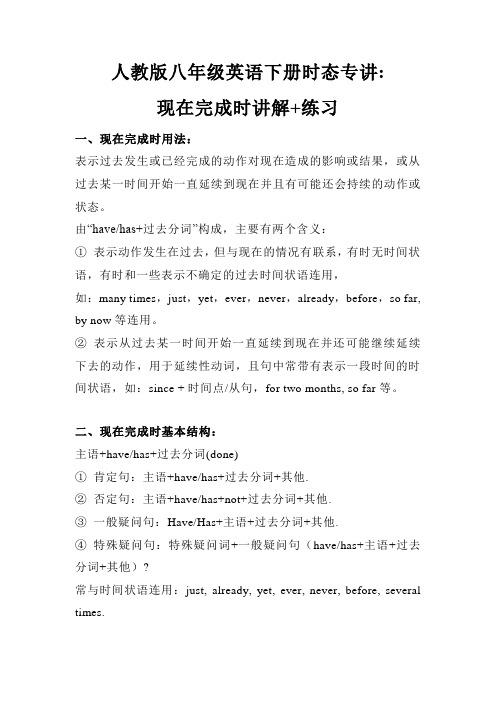
人教版八年级英语下册时态专讲:现在完成时讲解+练习一、现在完成时用法:表示过去发生或已经完成的动作对现在造成的影响或结果,或从过去某一时间开始一直延续到现在并且有可能还会持续的动作或状态。
由“have/has+过去分词”构成,主要有两个含义:①表示动作发生在过去,但与现在的情况有联系,有时无时间状语,有时和一些表示不确定的过去时间状语连用,如:many times,just,yet,ever,never,already,before,so far, by now等连用。
②表示从过去某一时间开始一直延续到现在并还可能继续延续下去的动作,用于延续性动词,且句中常带有表示一段时间的时间状语,如:since + 时间点/从句,for two months, so far等。
二、现在完成时基本结构:主语+have/has+过去分词(done)①肯定句:主语+have/has+过去分词+其他.②否定句:主语+have/has+not+过去分词+其他.③一般疑问句:Have/Has+主语+过去分词+其他.④特殊疑问句:特殊疑问词+一般疑问句(have/has+主语+过去分词+其他)?常与时间状语连用:just, already, yet, ever, never, before, several times.Already: “已经”; yet“仍然, 还”,这两个副词常常用于完成时态, 其中already常用于肯定句, yet常用于否定句和疑问句中。
如: Jim has already finished his work. Jim已经把他的工作做完了。
Mother hasn’t come home yet. 妈妈还没回来。
三、现在完成时一般过去时的区别:现在完成时表示的是与现在有关联的过去事件;而一般过去时则与现在毫无关系,只是单纯的过去的情况。
比较:I have lost my pen, so I have to buy one.我丢了钢笔,所以得去买一枝。
人教版八年级下册现在完成时专项讲解

现在完成时现在完成时(present perfect tense)通常表示过去发生的动作一直延续到现在,而且还可能继续下去,或者表示过去的行为对现在造成一定的影响,可能还会产生结果等。
1.现在完成时结构1.1.助动词have/has+动词过去分词。
其中,助动词要随着主语的变化而变化,当主语是第三人称单数时,助动词要用“has”。
例:Have you finished your work?He says that he has seen UFOs many times.1.2.现在完成时的缩写形式:I have=I ’ve have not= haven’thas not= hasn’t例:I’ve finished my work./He hasn’t finished his work.1.3.现在完成时的一般疑问句:Have/Has+主语+动词的过去分词+其他?肯定回答:Yes,主语+have/has.否定回答:No,主语+haven’t/hasn’t.例:----Have you finished your work?----Yes,I have./No,l haven’t.----Have they arrived?----Yes,they have./No,they haven’t. 1.4.1.通过加-ed的形式来构成规则动词的过去分词,就像我们构成这些动词的过去式方法一样。
大多数动词后+ed.如finish---finished.以字母e为结尾的动词后+d,如change---changed.以辅音字母加y结尾的动词,去掉y,再加ied.如carry---carried.以一个元音再加一个辅音结尾的短动词,双写辅音辅音字母再加ed.如stop---stopped1.4.2.构成不规则动词的过去分词的方法有所不同,需要特别记忆。
如:come---come; hurt---hurt. lend---lent; build---builtcatch---caught; keep---kept forget---forgotten tell---toldbe---been; have---had fall---fallen; fly---flowndraw---drawn; see---seen;think---thought.2.现在完成时的用法2.1.表示过去发生或已经完成的动作,对现在造成的影响或结果。
人教版八年级英语下册现在完成时讲解及练习
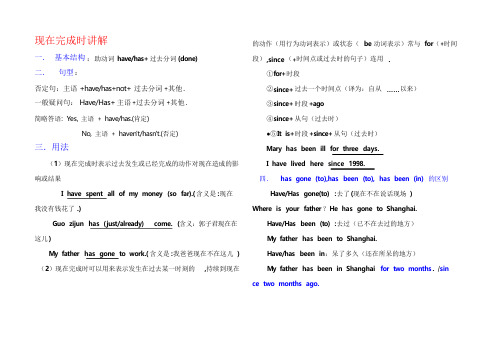
现在完成时讲解一.基本结构:助动词have/has+过去分词(done)二.句型:否定句:主语+have/has+not+过去分词+其他.一般疑问句:Have/Has+主语+过去分词+其他.简略答语:Yes,主语+have/has.(肯定)No,主语+haven't/hasn't.(否定)三.用法(1)现在完成时表示过去发生或已经完成的动作对现在造成的影响或结果I have spent all of my money(so far).(含义是:现在我没有钱花了.)Guo zijun has(just/already)come.(含义:郭子君现在在这儿)My father has gone to work.(含义是:我爸爸现在不在这儿)(2)现在完成时可以用来表示发生在过去某一时刻的,持续到现在的动作(用行为动词表示)或状态(be动词表示)常与for(+时间段),since(+时间点或过去时的句子)连用.①f or+时段②s ince+过去一个时间点(译为:自从……以来)③s ince+时段+ago④s ince+从句(过去时)●⑤I t is+时段+since+从句(过去时)Mary has been ill for three days.I have lived here since1998.四.has gone(to),has been(to),has been(in)的区别Have/Has gone(to):去了(现在不在说话现场)Where is your father?H e has gone to Shanghai.Have/Has been(to):去过(已不在去过的地方)My father has been to Shanghai.Have/has been in:呆了多久(还在所呆的地方)My father has been in Shanghai for two months./sin ce two months ago.五.现在完成时的标志1.现在完成时的含义之一是过去完成的动作对现在仍有影响,用以下四大标志词可以表达这种含义:*以already,just和yet为标志He has already got her help.他已得到她的帮助。
2017人教版八年级下英语现在完成时语法讲解
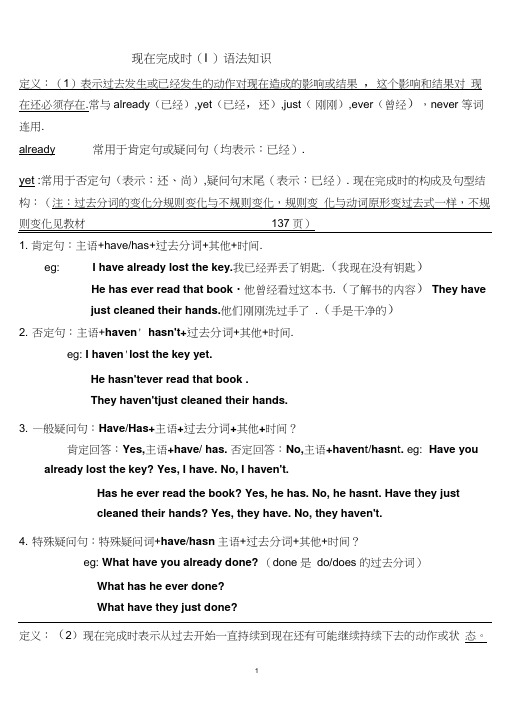
现在完成时(I )语法知识定义:(1)表示过去发生或已经发生的动作对现在造成的影响或结果,这个影响和结果对现在还必须存在.常与already(已经),yet(已经,还),just(刚刚),ever(曾经),never 等词连用.already 常用于肯定句或疑问句(均表示:已经).yet :常用于否定句(表示:还、尚),疑问句末尾(表示:已经). 现在完成时的构成及句型结构:(注:过去分词的变化分规则变化与不规则变化,规则变化与动词原形变过去式一样,不规则变化见教材137页)1. 肯定句:主语+have/has+过去分词+其他+时间.eg: I have already lost the key.我已经弄丢了钥匙.(我现在没有钥匙)He has ever read that book・他曾经看过这本书.(了解书的内容)They havejust cleaned their hands.他们刚刚洗过手了.(手是干净的)2. 否定句:主语+haven' hasn't+过去分词+其他+时间.eg: I haven'lost the key yet.He hasn'tever read that book .They haven'tjust cleaned their hands.3. —般疑问句:Have/Has+主语+过去分词+其他+时间?肯定回答:Yes,主语+have/ has. 否定回答:No,主语+haven t/hasn t. eg: Have you already lost the key? Yes, I have. No, I haven't.Has he ever read the book? Yes, he has. No, he hasnt. Have they justcleaned their hands? Yes, they have. No, they haven't.4. 特殊疑问句:特殊疑问词+have/hasn主语+过去分词+其他+时间?eg: What have you already done? (done 是do/does 的过去分词)What has he ever done?What have they just done?定义:(2)现在完成时表示从过去开始一直持续到现在还有可能继续持续下去的动作或状态。
英语人教版八年级下册现在完成时的概念及用法

例句:Have you ever been to Beijing? (你曾去过北京吗?) I have never heard of Bob. (我从未听说过鲍勃。) I have used this pen only three times. (我只用过这只钢笔三次。)
( not / finish )
4.You are going to a restaurant this evening. You phone to reserve(预定)a table. Later your friend sayI sha‘SvheaalllreIapdhyodnoentoe reserve a table? ’You say: No,__________________ (do) it.
例句:Thomas has studied Russian. (含义:现在不再学俄语) Thomas has studied Russian for three years. (=Thomas began to study Russian three years ago, and is still studying it now. (同第2点用法第一个例句)
3.You are eating in a restaurant this evening. The waiter thinks you have finished and starts to take your plate away.You saIyh:aWveanit’tafinished it yet. moment !_______________________
人教版八年级英语下册现在完成时态讲解和练习
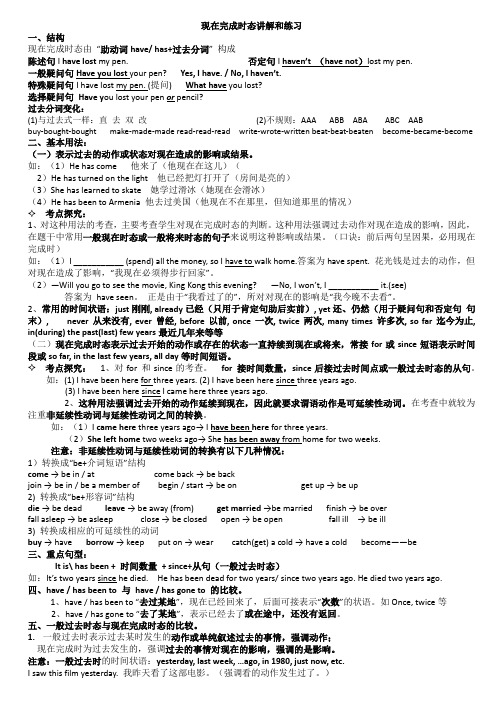
现在完成时态讲解和练习一、结构现在完成时态由“助动词have/ has+过去分词” 构成陈述句I have lost my pen.否定句I haven’t (have not)lost my pen.一般疑问句Have you lost your pen? Yes, I have. / No, I haven’t.特殊疑问句I have lost my pen. (提问) What have you lost?选择疑问句Have y ou lost your pen or pencil?过去分词变化:(1)与过去式一样:直去双改(2)不规则:AAA ABB ABA ABC AABbuy-bought-bought make-made-made read-read-read write-wrote-written beat-beat-beaten become-became-become 二、基本用法:(一)表示过去的动作或状态对现在造成的影响或结果。
如:(1)He has come 他来了(他现在在这儿)(2)He has turned on the light 他已经把灯打开了(房间是亮的)(3)She has learned to skate 她学过滑冰(她现在会滑冰)(4)He has been to Armenia 他去过美国(他现在不在那里,但知道那里的情况)✧考点探究:1、对这种用法的考查,主要考查学生对现在完成时态的判断。
这种用法强调过去动作对现在造成的影响,因此,在题干中常用一般现在时态或一般将来时态的句子来说明这种影响或结果。
(口诀:前后两句呈因果,必用现在完成时)如:(1)I ___________ (spend) all the money, so I have to walk home.答案为have spent. 花光钱是过去的动作,但对现在造成了影响,“我现在必须得步行回家”。
人教版英语八年级下册Unit8语法全解:现在完成时
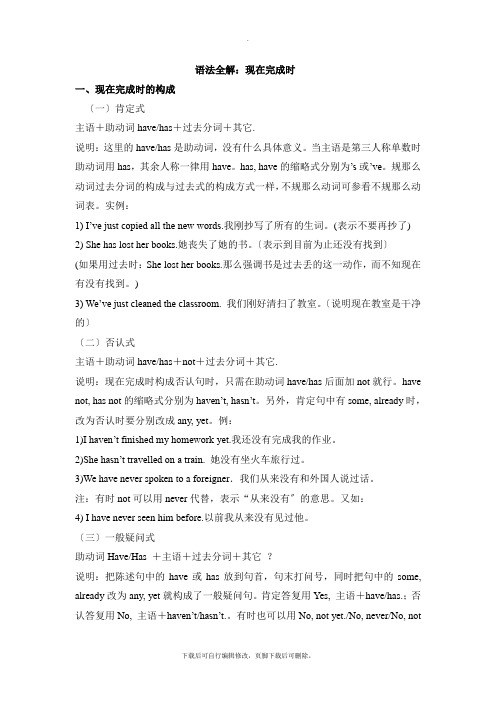
语法全解:现在完成时一、现在完成时的构成〔一〕肯定式主语+助动词have/has+过去分词+其它.说明:这里的have/has是助动词,没有什么具体意义。
当主语是第三人称单数时助动词用has,其余人称一律用have。
has, have的缩略式分别为’s或’ve。
规那么动词过去分词的构成与过去式的构成方式一样,不规那么动词可参看不规那么动词表。
实例:1) I’ve just copied all the new words.我刚抄写了所有的生词。
(表示不要再抄了)2) She has lost her books.她丧失了她的书。
〔表示到目前为止还没有找到〕(如果用过去时:She lost her books.那么强调书是过去丢的这一动作,而不知现在有没有找到。
)3) We’ve just cleaned the classroom. 我们刚好清扫了教室。
〔说明现在教室是干净的〕〔二〕否认式主语+助动词have/has+not+过去分词+其它.说明:现在完成时构成否认句时,只需在助动词have/has后面加not就行。
have not, has not的缩略式分别为haven’t, hasn’t。
另外,肯定句中有some, already时,改为否认时要分别改成any, yet。
例:1)I haven’t finished my homework yet.我还没有完成我的作业。
2)She hasn’t travelled on a train. 她没有坐火车旅行过。
3)We have never spoken to a foreigner.我们从来没有和外国人说过话。
注:有时not可以用never代替,表示“从来没有〞的意思。
又如:4) I have never seen him before.以前我从来没有见过他。
〔三〕一般疑问式助动词Have/Has +主语+过去分词+其它?说明:把陈述句中的have或has放到句首,句末打问号,同时把句中的some, already改为any, yet就构成了一般疑问句。
八年级下英语--现在完成时语法讲解
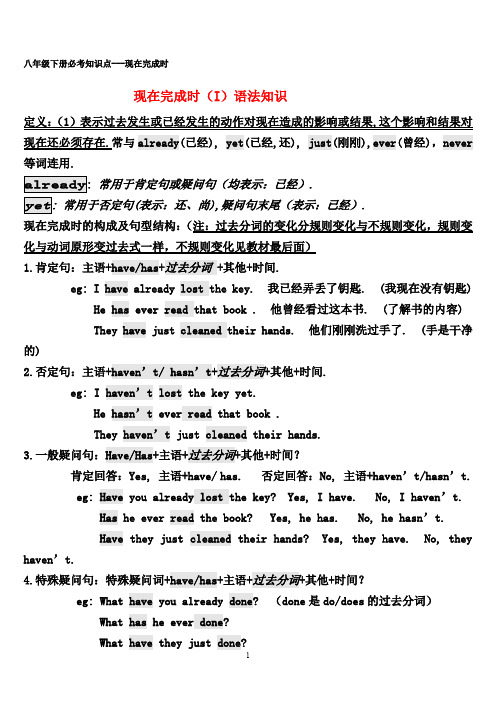
八年级下册必考知识点---现在完成时现在完成时(I)语法知识定义:(1)表示过去发生或已经发生的动作对现在造成的影响或结果,这个影响和结果对现在还必须存在.常与already(已经), yet(已经,还), just(刚刚),ever(曾经),never 等词连用.常用于肯定句或疑问句(均表示:已经).常用于否定句(表示:还、尚),疑问句末尾(表示:已经).现在完成时的构成及句型结构:(注:过去分词的变化分规则变化与不规则变化,规则变化与动词原形变过去式一样,不规则变化见教材最后面)1.肯定句:主语+have/has+过去分词+其他+时间.eg: I have already lost the key. 我已经弄丢了钥匙. (我现在没有钥匙) He has ever read that book . 他曾经看过这本书. (了解书的内容)They have just cleaned their hands. 他们刚刚洗过手了. (手是干净的)2.否定句:主语+haven’t/ hasn’t+过去分词+其他+时间.eg: I haven’t lost the key yet.He hasn’t ever read that book .They haven’t just cleaned their hands.3.一般疑问句:Have/Has+主语+过去分词+其他+时间?肯定回答:Yes, 主语+have/ has. 否定回答:No, 主语+haven’t/hasn’t. eg: Have you already lost the key? Yes, I have. No, I haven’t. Has he ever read the book? Yes, he has. No, he hasn’t.Have they just cleaned their hands? Yes, they have. No, they haven’t.4.特殊疑问句:特殊疑问词+have/has+主语+过去分词+其他+时间?eg: What have you already done? (done是do/does的过去分词)What has he ever done?What have they just done?定义:(2)现在完成时表示从过去开始一直持续到现在还有可能继续持续下去的动作或状态。
初中英语人教新目标八年级下册现在完成时语法知识精讲

八年级英语下册现在完成时知识精讲一、定义现在完成时主要用来表示过去发生的动作对现在造成的影响或结果。
如:I have already seen the film.She has just had a bath.第一句说明看电影是过去发生的,用了现在完成时是要表示说话者可能不想再看了,或者对该电影的内容已经很熟悉了,等等。
第二句说明她洗澡是过去发生的,用了现在完成时是要表示她不需要再洗澡了等。
二、基本结构现在完成时的句子结构一般为:肯定句主语+have/has+过去分词+其他成分We have already had lunch.He has been away for a week.肯定句:主语+have/has+动词的过去分词+其他否定句:主语+have/has+not+动词的过去分词+其他一般疑问句:Have/Has+主语+动词的过去分词+其他特殊疑问句:特殊疑问词+一般疑问句(have/has+主语+过去分词+其他)三、主要用法1、表示过去发生并且已经完成的动作对现在造成的影响或结果。
此时,常和谓语动词一起使用的副词有already、just、never、ever、yet等。
如:They have already come back from the museum.She has already finished her homework.2、表示一个动作或状态从过去开始,一直延续到现在,还可能继续下去。
此时常与:for +时间段、since+过去时间点、since+一般过去时态的从句、since+一段时间+ago、 in the past/last +时间段连用。
谓语动词用延续性动词,可以用how long提问。
→for + 一段时间I have learned English for 8 years→since + 过去的一个时间点I have learned English since 2001→since + 时态为一般过去时的时间状语从句I have learned English since I was 5 years old注意:现在完成时中,与一段时间连用时应注意句中的谓语动词须是延续性动词,非延续性动词不可和一段时间连用。
- 1、下载文档前请自行甄别文档内容的完整性,平台不提供额外的编辑、内容补充、找答案等附加服务。
- 2、"仅部分预览"的文档,不可在线预览部分如存在完整性等问题,可反馈申请退款(可完整预览的文档不适用该条件!)。
- 3、如文档侵犯您的权益,请联系客服反馈,我们会尽快为您处理(人工客服工作时间:9:00-18:30)。
现在完成时(I)语法知识等词连用.常用于肯定句或疑问句(均表示:已经).(表示:还、尚),疑问句末尾(表示:已经).现在完成时的构成及句型结构:(注:过去分词的变化分规则变化与不规则变化,规则变化与动词原形变过去式一样,不规则变化见教材137页)1.肯定句:主语+have/has+过去分词+其他+时间.eg: I have already lost the key.我已经弄丢了钥匙. (我现在没有钥匙) He has ever read that book .他曾经看过这本书. (了解书的内容)They have just cleaned their hands.他们刚刚洗过手了. (手是干净的) 2.否定句:主语+haven’t/ hasn’t+过去分词+其他+时间.eg: I haven’t lost the key yet.He hasn’t ever read that book .They haven’t just cleaned their hands.3.一般疑问句:Have/Has+主语+过去分词+其他+时间?肯定回答:Yes, 主语+have/ has. 否定回答:No, 主语+haven’t/hasn’t.eg: Have you already lost the key? Yes, I have. No, I haven’t.Has he ever read the book? Yes, he has. No, he hasn’t.Have they just cleaned their hands? Yes, they have. No, they haven’t.4.特殊疑问句:特殊疑问词+have/has+主语+过去分词+其他+时间?eg: What have you already done?(done是do/does的过去分词)What has he ever done?What have they just done?定义:(2)现在完成时表示从过去开始一直持续到现在还有可能继续持续下去的动作或状.eg: She has learned English for 5 years. (她已经学习五年英语了)解释:一直在学,持续了五年,并且还可能持续学下去.He has lived in Beijing since he was born . (自从他出生以后就居住在北京)解释:从出生后就一直住在北京,持续到现在,还有可能一直住下去)Have you stayed here since3 o’clock?(自从3点后你就一直呆在这儿吗?)例题:选用for和since填空:1. We haven’t seen each other ___ a long time.2. His father has been in the factory ____ 10 years ago.3. The film has been on ____ 20 minutes.4. Mr. Green has worked here _____ he came to China.5. His grandparents have been dead _____ several years.6. It’s five years ______ we met last time.7.I have already had dinner. (否定)I _______ _______ dinner _______.8. Mum has cooked the dinner. Mum _______ ________ the dinner.9. Susan has learned English at school. Susan________ ________English at school.10. I have already had dinner. (提问)_______ _______ ________ _________ _______?11. He has just finished his homework. _______ _______ _______ ________ ________?12. Susan has learned English at school. _______ _______ ________ ________ _______?过去的时间状语连用.eg: I have already seen the film. (现在完成时,已经看了这部电影,并且知道电影的内容)I saw the film last week. (一般过去式,因为后面有表示过去的时间状语last week)He has lived here since 1993. (现在完成时,后面有since引导的时间状语从句)He lived here in 1993. (一般过去时,1993年住在这儿,现在没住在这儿了)例题:1. _____ you ________(clean) the room? Yes, we__________(do) that already.2. When _______ you ______(do) it? We _______(do) it an hour ago.3.______ he ______(see) this film yet? Yes.4. When _____ he _____(see) it? He______ it last week.5. I _______ (read) the novel twice. It’s interesting.6. Mr. Chen _________(give)up smoking last year.7. She _____(go) to Pairs, hasn’t she? Yes.How ____ she ____(go) there? She ____(go) there by air.现在完成时(II)语法知识1.构成:含有be动词的现在完成时的谓语部分由“have/has+ been+ to+地点”构成,表示:曾经去过某地… (been是be的过去分词,不规则变化)2.基本句型:(1)肯定句:主语+have/has+ been+ to+地点.eg: I have been to Australia.They have been to Beijing.He has been to South Africa.(2)否定句:主语+haven’t/hasn’t+ been+ to+地点.eg: I haven’t been to Australia.They haven’t been to Beijing.He hasn’t been to South Africa.(3)一般疑问句:Have/Has+主语+been + to+ 地点?肯定回答:Yes, 主语+ have/has. 否定回答:主语+haven’t/ hasn’t.eg: Have you been to Australia? Yes, I have. No. I haven’t.Have they been to Beijing? Yes, they have. No, they haven’t.Has he been to South Africa? Yes, he has. No, he hasn’t.(4)特殊疑问句:特殊疑问词+have/has+ 主语+ been?eg: Where have you been?Where have they been?Where has he been?3.用法:用来表示之前已经发生和完成度的动作与状态,其结果却和现在有联系.动作和结果发生在过去,但它的影响现在还在.可以和never, ever,once, twice, three/four…times 等副词连用.eg: They have been to Chongqing twice.I have never been to Sichuan.Has she ever been to Hainan?3.区别:10分钟了。
例题:1.—Where is your brother?—He __________ the shop. He’ll be back soon.2. — _____ you ever _______ to America?—Yes, I _______ New York twice.3. —David ___________ Australia. —I’m sure he has already arrived.4. —Is Benny here?—No, he ______ the school library. He left five minutes ago.4.Mike and his parents __________ the south for half a year.6. Mum is not at home now. she _________ the shop.7. You can’t find him. He__________ Xi’an.8. Mr. Zhang __________ this school for ten years. He knows everyone here.9. Miss. Brown __________ China three times.10. I __________ the West lake, Look, I have taken many photos of it .11. Tom ___________ Jim’s home, but he hasn’t come back.12. We ____________ the bookshop and bought many books.13. My parents _________ Shandong for ten years.现在完成时(III)语法知识动词按其动作发生的方式,发生过程的长短可分为延续性动词与非延续性动词。
1.延续性动词:表示能够延续的动作,也可以表示经验与经历.eg:learn, work, stand, lie, walk, sleep, keep, wait, watch, sing, read, stay, live…eg: He has lived here for 6 years.(他在这儿住了六年了,一直住在这儿,live是延续性动词,并且很有可能继续居住下去)I have known her since then.(自从那时起我就认识她了,一直都认识,know是延续性动词)2.非延续性动词:也成终止性动词或瞬间动词,表示不能延续的动作,这种动作发生后立即结束.eg:open, close, begin, finish, come, go, move, borrow, lend, buy, die…非延续性动词不能与for 和since 引导的时间状语连用,常用的时间状语有two years ago, at 5 o’clock, yesterday, the day before yesterday, this morning 等表示过去的时间. eg: His grandmother died 10 years ago.She finished the work at 6 o’clock.2.非延续性动词与延续性动词之间的转换(常用)(1). 转化为相应的延续性动词,用于现在完成时态eg: borrow →keep buy →have put on →wear get to know →know get to sleep →sleep catch a cold →have a cold (2).转化为“be+形容词/副词/介词/名词”eg: begin/start →be on go out →be out die →be deadopen →be open get to/ arrive in(at)/reach →be in+地点leave →be away(from) finish →be over fall ill →be illget up →be up fall asleep →be asleep join →be in+活动/组织go to school →be in school become →be make friends →be friends close →be closed go to bed →be in bed come/ go →be + 相应的介词短语例:下面是句子的同义句转换eg: 1. The old man died four years ago. (一般过去时)The old man has been dead four years. (现在完成时,将die变为bedead)The old man has been dead since four years ago. (现在完成时,since跟过去的时间点)2. I borrowed the book five days ago.3. He bought the bike three years ago.I have kept the book for five days. He has had the bike for three years.I have kept the book since five days ago. He has had the bike since three years ago.4. She went to school two days ago.5. My sister became a nurse one year ago.She has been in school My sister has been a nurse for one year.My sister has been a nurse since one year.例题:1.Li Lei joined the Party three years ago. (同义句)Li Lei the Party three years.Li Lei the Party three years ago.2. My father left Guizhou last week. (同义句)My father Guizhou a week.My father Guizhou last week.3. The factory opened in 1996. (同义句)The factory ten years.The factory since 1996.4. Mr. Wang reached Beijing five days ago.Mr. Wang Beijing five days ago.Mr. Wang Beijing five days.5. The film began ten minutes ago.The film for .The film since6. She bought the new car three years ago.She _______ ________ the new car _______ three years.She _______ ________ the new car ________ three years ago.7. They came to China ten years ago.They _____ _____ _____ China _____ ten years.They _____ _____ _____ China _____ ten years ago.。
